It feels like everyone’s looking for an edge these days—whether you’re cramming for finals, hustling through back-to-back meetings, or just trying to keep up with a never-ending to-do list. Enter the world of over-the-counter focus pills. You’ve probably seen these brain-boosting supplements advertised on social media, Amazon, or even at your local pharmacy, promising everything from supercharged memory to limitless productivity. But what’s the real story behind these popular pills? Are they safe? Are they all hype? And—most importantly—do they actually work?
Let’s break down the facts, bust the biggest myths, look at the risks, and spotlight the real benefits (if any) of today’s focus supplements.
The Rise of Focus Pills in Modern Life
Let’s be honest: our brains are under more pressure than ever before. Work deadlines, digital distractions, school stress, and the constant buzz of notifications can leave anyone feeling mentally wiped out. It’s no wonder so many people are searching for ways to boost focus and productivity—without a doctor’s prescription.
Focus pills (sometimes called “nootropics” or “brain supplements”) are marketed as the quick fix: just pop a pill and say goodbye to brain fog, right? But as with any shortcut, there’s more to the story.
What Counts as an Over-the-Counter Focus Pill?
When we talk about over-the-counter focus pills, we mean any supplement you can buy without a prescription that claims to improve mental performance. This includes everything from caffeine pills and herbal blends to branded “study aids” and even single-ingredient capsules like L-theanine, bacopa monnieri, or ginkgo biloba.
These pills can be found everywhere—vitamin shops, online, gas stations, you name it. But not all are created equal, and “natural” doesn’t always mean “safe” or “effective.”
What’s Really in Over-the-Counter Focus Pills?
There’s no magic bullet, but many focus supplements contain similar core ingredients—some backed by science, others just trendy.
Common Ingredients and How They Work
-
Caffeine: The OG stimulant. Boosts alertness and reaction time, but can cause jitters or a crash if you overdo it.
-
L-theanine: Found in green tea, known for promoting calm, focused energy—often stacked with caffeine to smooth out side effects.
-
Bacopa monnieri: An herb with some real research showing it can help with memory over time.
-
Ginkgo biloba: Often included for its potential to improve blood flow and cognitive function.
-
Rhodiola rosea: An adaptogen that may help with mental fatigue and stress.
-
Lion’s mane mushroom: Getting lots of hype for its possible role in nerve growth and memory.
Natural vs. Synthetic Focus Pills
-
Natural focus pills: Usually contain plant extracts, amino acids, and sometimes vitamins or minerals.
-
Synthetic focus pills: These might include racetams or other lab-designed compounds, but true synthetic nootropics are less common in the OTC market in the U.S. due to regulations.
The best over-the-counter focus pills typically use natural ingredients with some research behind them—but label claims can be misleading.

Myths About Over-the-Counter Focus Pills
There’s a ton of misinformation out there. Let’s set the record straight on some of the biggest myths:
“They Work Like Prescription Drugs”
No, they don’t. Prescription meds for ADHD or narcolepsy (like Adderall or modafinil) are powerful, tightly controlled, and come with real risks. Most over-the-counter focus supplements offer mild, gradual effects—think of them as “brain vitamins” rather than miracle pills. If something sounds too good to be true, it probably is.
“If It’s Natural, It Must Be Safe”
Not always. Natural ingredients can still cause side effects, interact with medications, or trigger allergies. For example, high doses of caffeine from “natural” sources can spike blood pressure, cause anxiety, and wreck your sleep. Herbs like ginkgo can interact with blood thinners. Always check with your doctor if you have health issues or take other meds.
“More Is Always Better”
When it comes to focus supplements, the opposite is true. Overdoing it can backfire—too much caffeine can leave you wired and anxious, while excess adaptogens can mess with your hormone balance. Stick to recommended dosages and never combine multiple products with the same main ingredients.
Real Risks of Over-the-Counter Focus Pills
Just because you can buy it at the store doesn’t mean it’s risk-free.
Side Effects and Health Concerns
-
Jitters, insomnia, and rapid heartbeat (especially from too much caffeine or certain stimulants)
-
Digestive upset or headaches from certain herbs or poorly-formulated blends
-
Mood swings, anxiety, or even depression with regular high-dose use of some ingredients
-
Interactions with prescription meds—always double-check if you take anything for blood pressure, mood, or chronic illness
Some people are more sensitive than others, and certain groups (pregnant or nursing women, teens, people with heart or psychiatric conditions) should be extra cautious.
Who Should Avoid Focus Supplements?
-
Anyone with a history of heart problems, anxiety disorders, or seizures
-
Teens and children (unless recommended by a doctor)
-
People on prescription meds for mental health or blood pressure
-
Pregnant or breastfeeding women
Unregulated Market and Label Confusion
Supplements aren’t as tightly regulated as prescription drugs. That means labels can be inaccurate, dosages inconsistent, and sometimes products even contain undisclosed ingredients. Always buy from reputable brands with third-party testing.
The Real Benefits—What Can You Actually Expect?
Not all focus pills are snake oil. When used smartly, some over-the-counter supplements can actually help with mild focus, attention, and memory issues.
Ingredients With Proven Benefits
-
Caffeine + L-theanine: This classic combo offers alertness with calm focus, perfect for study or work sessions.
-
Bacopa monnieri: Regular use over several weeks can help with memory and learning—great for students.
-
Lion’s mane mushroom: Some early studies suggest it may support nerve growth and cognitive clarity, especially in older adults.
-
Rhodiola rosea: Can help fight mental fatigue and boost stamina, especially during high-stress times.
-
Omega-3 fatty acids: Not a classic “focus pill,” but important for brain health and long-term memory.
Who Might See the Most Improvement?
-
Students and professionals with long workdays or study marathons
-
People with mild brain fog or occasional trouble focusing (not clinical ADHD)
-
Adults wanting a gentle, natural brain boost without prescription meds
Remember, results are usually subtle and gradual—not instant. Supplements work best alongside healthy habits: good sleep, balanced nutrition, regular exercise, and real breaks from screens.
Smart Ways to Use Focus Pills Safely
If you’re curious about trying over-the-counter focus pills, it’s all about being smart, skeptical, and consistent. Don’t just grab the flashiest product on TikTok or Instagram—do your homework.
How to Choose a Quality Product
-
Look for third-party testing: Reputable brands will test their products for purity, potency, and safety. Look for NSF, USP, or other independent certifications.
-
Check the ingredient list: Less is often more. Avoid long lists of “proprietary blends” with no clear dosages.
-
Do your research: Search for clinical studies supporting the main ingredients—not just marketing claims.
-
Avoid sketchy retailers: Buy directly from trusted supplement companies or certified health stores.
Dosage, Cycling, and Combining With Healthy Habits
-
Start with the lowest effective dose: Especially if you’re sensitive to stimulants or new to brain supplements.
-
Cycle your supplements: Use focus pills only when you really need them (like during finals or big projects). Taking breaks helps prevent tolerance and dependence.
-
Don’t mix with prescription meds: Unless your doctor specifically okays it, never stack OTC supplements with prescription stimulants or mood meds.
-
Pair with healthy habits: No pill can replace sleep, real food, hydration, and regular exercise. Focus supplements are a tool—not a cure-all.
Conclusion: Should You Try Over-the-Counter Focus Pills?
Over-the-counter focus pills aren’t magic, but they’re not all hype, either. For many people, a carefully chosen supplement can offer a gentle boost in focus, memory, or energy—especially when combined with smart study or work habits. But it’s crucial to understand the risks, avoid sketchy products, and never ignore side effects.
If you’re healthy, not on medication, and stick to reputable brands, trying a basic supplement like caffeine + L-theanine, bacopa, or lion’s mane can be a safe experiment. Just manage your expectations—no over-the-counter pill will turn you into a genius overnight. Lasting focus and mental energy still come from the basics: great sleep, balanced nutrition, and giving your brain real downtime.
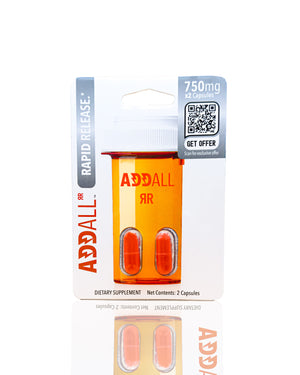
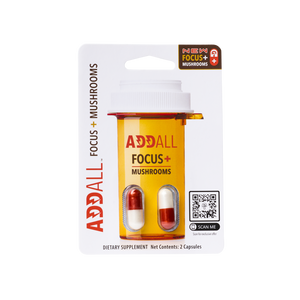


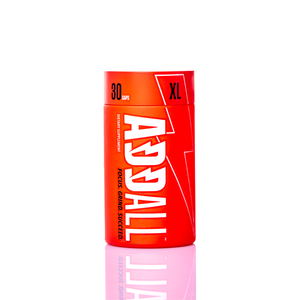
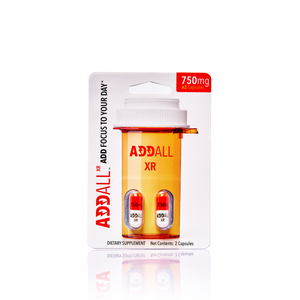

 Addall XR
Addall XR
 Addall XL
Addall XL
 Addall
Addall
 Addall
Addall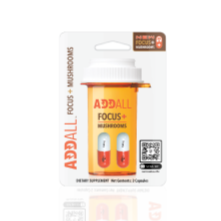 Addall
Addall Addall
Addall Compare
Compare




















































